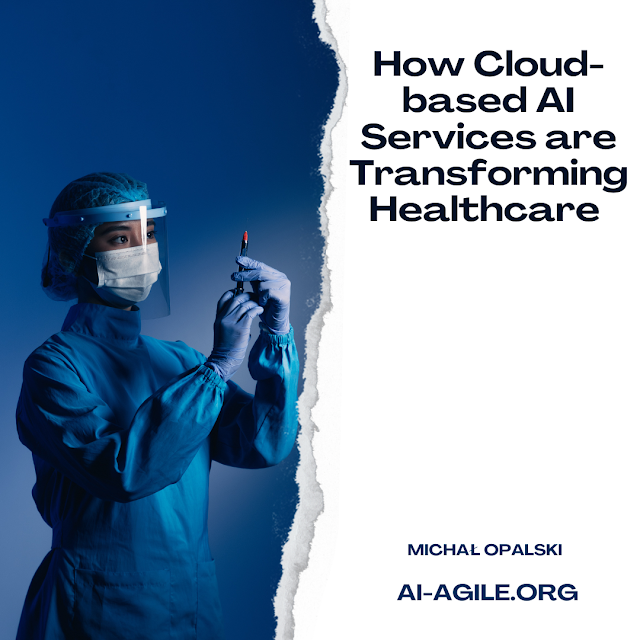How Cloud-based AI Services are Transforming Healthcare - Michał Opalski / ai-agile.org
In today's world, the integration of artificial intelligence (AI) with cloud computing has brought forth a revolution across various industries, with healthcare standing out as a prominent beneficiary. The healthcare sector, with its vast amounts of data and the urgency of delivering accurate and timely results, has found a reliable partner in cloud-based AI services. These services promise to optimize processes, enable precision medicine, and improve patient care. In this article, we'll delve deep into how these innovative services are transforming healthcare, supported by relevant examples.
1. Enhanced Diagnosis and Prediction
One of the significant challenges in healthcare has been accurate and early diagnosis. Cloud-based AI services have stepped in to facilitate this by analyzing large datasets that were previously insurmountable for human experts.
Example: Google's DeepMind has developed an AI that can spot eye diseases in scans. When these algorithms are hosted on the cloud, they can be accessed by ophthalmologists worldwide, ensuring timely diagnosis and intervention, even in remote areas without experts.
2. Personalized Treatment
The one-size-fits-all model in medicine is slowly getting replaced by personalized treatment plans. AI can analyze an individual’s genetic makeup and lifestyle to suggest treatments tailored to them.
Example: IBM's Watson for Oncology analyzes a patient's medical information against a vast array of data and research to recommend personalized treatment options. Cloud access means that oncologists anywhere can avail of this service to make informed decisions.
3. Drug Discovery and Development
Drug discovery is a lengthy and costly process. However, with AI algorithms that can predict how different compounds can interact or can analyze patient data for drug reactions, the process becomes streamlined and more efficient.
Example: Atmwise, a company that uses AI for drug discovery, leverages cloud computing to predict which molecules might be effective in treating diseases, thereby significantly reducing the drug development timeframe.
4. Virtual Health Assistants
Cloud-based AI virtual assistants are increasingly becoming an integral part of patient care, offering 24/7 service answering queries, setting up appointments, and providing medication reminders.
Example: Buoy Health has an AI-driven chatbot that listens to patients' symptoms and guides them to the appropriate care. Since it's cloud-based, the chatbot continuously learns from patient interactions across the globe, refining its algorithms for better assistance.
5. Remote Monitoring and Predictive Analysis
With wearables and IoT devices collecting health data, cloud-based AI services can analyze this data in real-time to monitor patient health and predict potential health issues.
Example: Fitbit, with its cloud-backed algorithms, can monitor heart rates and sleep patterns. Any anomalies detected can be an early warning system for users and medical professionals.
6. Streamlining Administrative Tasks
From transcribing notes to managing patient appointments, cloud-based AI services are helping reduce the administrative burden on healthcare professionals.
Example: Amazon's Transcribe Medical is a cloud service that uses AI to convert doctor-patient conversations into text automatically. This aids in maintaining accurate records without manual intervention.
7. Enhanced Imaging Analysis
Medical imaging, like X-rays, MRIs, and CT scans, produce vast amounts of data. AI can assist radiologists by flagging potential issues and reducing false positives.
Example: Zebra Medical Vision offers cloud-based algorithms that analyze medical images, helping radiologists prioritize and diagnose with improved accuracy.
Conclusion
The marriage between AI and cloud computing in the healthcare sector is a perfect example of how technology can be leveraged for the greater good. By streamlining processes, enabling accurate diagnoses, and offering personalized care, cloud-based AI services are genuinely transforming healthcare into a more patient-centric and efficient industry. As technology evolves and the world moves more into the digital realm, one can only expect further advancements and integrations that will continue to shape the future of healthcare.


